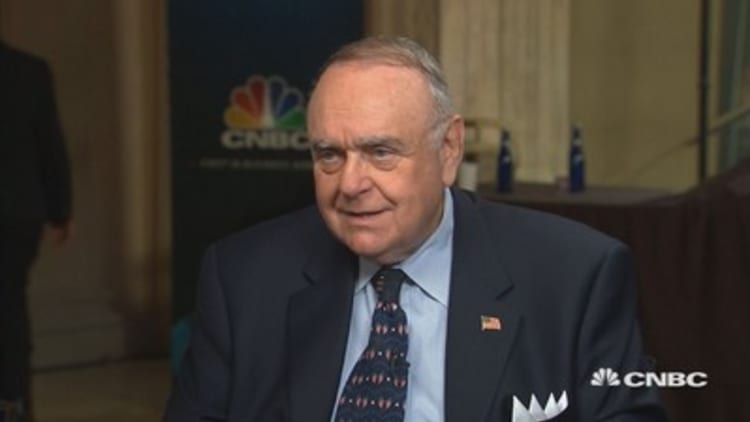
President Donald Trump sought a billionaire investor's advice twice on whether he considered Amazon a monopoly during a dinner this summer, weeks before federal regulators signed off on the e-commerce giant's acquisition of Whole Foods Market.
Leon Cooperman, a former partner at Goldman Sachs who runs the hedge fund Omega Advisors, said Thursday he attended a dinner with 10 people in July during which Trump twice asked him the monopoly question.
Cooperman, whose fund owned about $10.3 million of Amazon stock at the end of the third quarter, said his answer to the president was no.
"President Trump asked me twice if I thought Amazon was a monopoly and I said, 'No, Mr. President,'" Cooperman recounted on CNBC's "Halftime Report." "I think they've out-executed people. I think they've done a very good job."
Trump has repeatedly called out Amazon and its billionaire founder, Jeff Bezos, taking to his favorite forum, Twitter, to rail against the e-commerce company about not charging "internet taxes." (Amazon does collect state sales tax where it applies). He also likes to draw connections between Bezos' other major investment, The Washington Post, and Amazon.
In June, Amazon announced its head-turning $13.7 billion deal for the organic grocery chain, a move that sent shock waves through the retail sector. Amazon has been blamed for the demise of brick-and-mortar stores as consumer preferences have shifted to online shopping and home delivery.
Amazon started out as an online bookseller in the 1990s and has expanded to offer a vast array of products on its website. Whole Foods brought it into grocery and food, a $700 billion U.S. market, and gave it a springboard of 465 locations that can serve as distribution centers for a variety of products. Amazon is also thought to be exploring involvement in the pharmacy or medical devices industry and recently introduced a fashion platform.
The Federal Trade Commission waved through the Whole Foods deal in August.
Trump appears to have reserved his antitrust fight for another giant deal: AT&T's pending purchase of Time Warner, which is now headed to court. Trump, who has also openly criticized Time Warner's CNN news channel, has said since his campaign he wouldn't allow that deal to go through because it concentrates too much power.
Antitrust is a major risk to Amazon and other technology giants such as Facebook and Google, Cooperman said. "Governments are going to stick their beak into this thing, and that's a risk."
The hedge-fund manager settled accusations of insider trading by the Securities and Exchange Commission earlier this year. Cooperman said Trump suggested at the dinner in July that the SEC case, filed in September 2016, was retaliation for an open letter Cooperman published to President Barack Obama in 2011 criticizing his perceived anti-Wall Street views.
"I changed the subject very quickly," Cooperman said of the Amazon monopoly discussion. "He did say to me, "Lee, you have a fabulous reputation, you think your open letter to President Obama created your SEC problems?'"
"I told him I didn't know," Cooperman recalled. "'Mr. President, yes, he treated me very unfairly but I've got to get on with my life.'"

